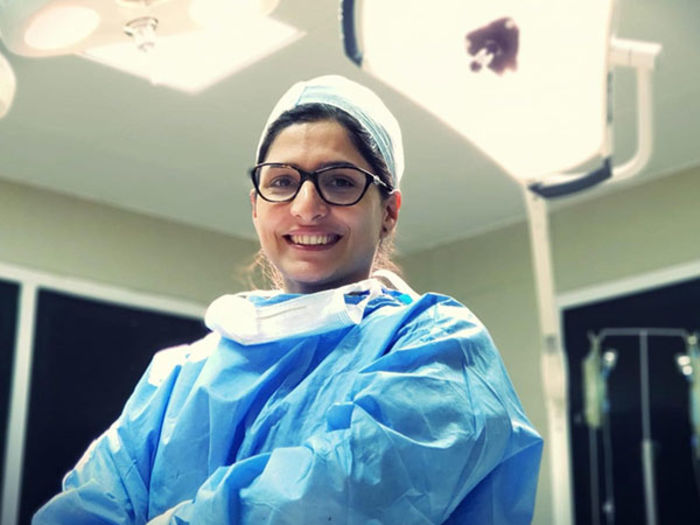Dr. Shabnam Bashir, Kashmir’s trailblazing Oncosurgeon, highlights the growing cancer crisis and advocates for awareness and timely screening
By Jahangeer Ganaie
Breast cancer continues to stand as a significant contributor to the alarming number of cancer-related fatalities among women in their reproductive years. Approximately one-third of cancer cases can be attributed to behavioral and lifestyle factors, according to insights shared by the eminent Oncosurgeon, Dr. Shabnam Bashir.
Dr. Shabnam, a trailblazing figure in the field of oncology as Kashmir’s first female organ-specific Oncosurgeon, brings to her practice a profound mastery of advanced technologies, including Robotics, CRS with HIPEC, PIPAC therapy, and laser therapy. Her emphasis on the imperative of timely cancer diagnosis and screening is crucial in facilitating optimal treatment.
She. Shabnam underscores the disconcerting fact that cancer has metamorphosed into a modern-day epidemic, with approximately 2 crore new cases being diagnosed across the globe annually, leading to an appalling one crore deaths attributed to this ruthless disease each year. She soundly asserts that the dire need for heightened awareness becomes painfully evident when nearly 60 percent of women seek treatment for breast cancer only at the advanced stages, due to a glaring lack of awareness.
Further elaborating on these sobering statistics, Dr. Shabnam, citing the Indian Council of Medical Research (ICMR), provides a stern warning of a projected 12% surge in cancer cases over the next five years. She rightly cautions that these estimates may, in fact, be conservative due to the unfortunate dearth of well-maintained, population-based cancer registries across the country.

“Breast cancer,” she lamentably points out, “has witnessed a stark upswing and now reigns as the foremost cause of cancer-related mortality among women of reproductive age.” Her lament continues, noting that approximately 23 lakh new cases are registered globally each year, with a significant 10% (equating to 2.23 lakh cases) afflicting India, leading to a heart-wrenching tally of around 1 lakh casualties annually.
She attributes this harrowing escalation to changes in lifestyle, the relentless march of modernization, environmental pollution, radiation exposure, and the ceaseless toll of stress. However, Dr. Shabnam is quick to point out that the silver lining lies in the increased awareness that has led to higher diagnosis rates, contributing to the overall surge in cancer incidence.
The Oncosurgeon, ever vigilant in her mission, reiterates that 30-50% of cancer cases are, indeed, preventable, while a disproportionate majority of cancer-related deaths mercilessly stalk the populations of low and middle-income countries.
Drawing attention to a disconcerting regional perspective, Dr. Shabnam shares that the Regional Cancer Registry Kashmir (2014-2016) has registered a staggering 5336 new cases of breast cancer at SKIMS, Soura. In essence, this translates to roughly five new cases being reported daily in a single hospital in the picturesque valley of Kashmir.
Furthermore, she raises the alarm that this trend points to a relentless upward spiral in breast cancer incidence. The chilling statistics reveal that 1 in every 28 Indian women faces the grim specter of developing breast cancer during her lifetime, with urban women being particularly vulnerable at a rate of 1 in 22, compared to their rural counterparts at 1 in 60.
Delving deeper into the demographics, Dr. Shabnam brings to light a study conducted at SKIMS (2014-2016), which uncovered that colorectal cancer (CRC) is most prevalent in the age group of 56-65, with a staggering 25% incidence. Alarmingly, approximately 20% of cases occur in individuals under the age of 35, casting a pall of despair over the youth. Shockingly, 50% of cases are diagnosed at the dreaded Stage 3, and one-third of all cancers have direct links to behavioral and lifestyle factors, a fact that cannot be ignored.
Dr. Shabnam fervently underscores the desperate need for raising awareness regarding lifestyle modifications, which hold the key to mitigating the risk of various cancers. In her impassioned plea, she highlights the ominous role played by tobacco consumption, responsible for a staggering 2500 daily casualties in India. In equal measure, she stresses the pivotal importance of understanding the insidious roles of alcohol consumption, dietary habits, stress management, sleep patterns, body weight, radiation exposure, carcinogenic substances, hormonal treatments, and physical activity.
The gravity of the situation is further underscored as Dr. Shabnam paints a bleak picture of cancer in India occurring a decade earlier than in Western nations. Regrettably, many patients present with advanced-stage cancers, contributing to dismal survival rates. The dire need for creating mass awareness regarding the root causes of cancer, early detection through screening, prompt medical intervention at the slightest hint of trouble, and the adoption of preventive measures, including profound lifestyle changes, is the clarion call to prevent cancer from continuing to claim precious lives within our families and society as a whole.
Leave a Reply